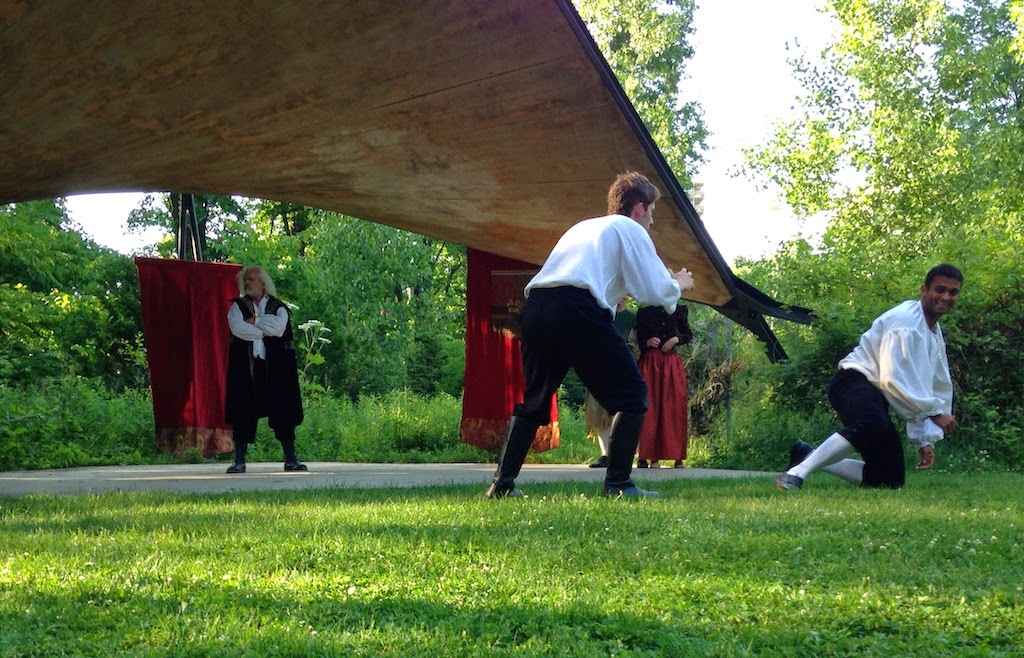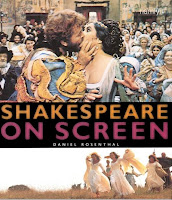Experiments on human subjects cause much soul-searching in our society. As a result of this ingrained mistrust, I'm uncomfortable with the basic premise of Shakespeare's
Measure for Measure. In the play, the Duke of Vienna leaves a morally questionable man, Angelo, in charge of his duchy. While Angelo abuses his delegated power, the Duke disguises himself as a friar and watches and even manipulates some of Angelo's victims. There are no specifics to show that this is Vienna: it might as well be Venice or Stratford-on-Avon.
The Story. In an excess of legalism, Angelo imprisons Claudio and sentences him to death for having slept with his fiance before marriage. (They couldn't get married because of some problem resolving dowry issues that were comprehensible in Shakespeare's time but are not so clear now, I think.) She's off somewhere, pregnant. In his early appearances, characters portray Angelo as a cold, unfeeling man: his blood is "snow-broth." (I, iv, 58)
Claudio's sister Isabel is about to take vows as a nun. She's called in to beg Angelo to free him. Angelo demands sexual favors from her. The disguised Duke participates in quite a few of the conversations, disguised as a Friar -- he even hears confessions, and elicits unwary remarks against himself. In asides and to one in the know he gives various explanations for his experimentation and his desire to be outside of his usual reponsible role as Duke.

The Duke already knew that Angelo had jilted a woman, Mariana, several years before, when her dowry was lost. So does this mean the Duke didn't hesitate to put a morally compromised man in charge? Not clear.
The duke ensures that Mariana is sent in Isabel's place to sleep with Angelo. The next morning, he demands Claudio's head on a platter. He's clearly a bad egg! With the Duke's connivance, the jailers bring the head of a man who died in prison of natural causes -- and coincidentally resembles Claudio. (Mariana is shown in the drawing by Rosetti.)
In the last act, the Duke undisguises himself and shows up to straighten things out and extract confessions, apologies, and reconciliations from everyone, including a forced marriage of Angelo to Mariana. Isabel is offered the death of Angelo, but forgives him. Claudio returns. All occurs with maximum drama and surprises.
The Shakespearan Side of the Play. Shakespeare entertains us with lots of philosophizing by the various characters, and a bit of baudy joking between some low-lifes and a brothel owner named Mistress Overdone -- she had nine husbands: "Overdone by the last." (II, i, 211) The action flows magnificently, and the characters' emotions and personalities are very fully developed. Pure Shakespeare. But that darn Duke is so manipulative: how could he do that to them?
Says the disguised Duke when comforting Claudio, whose death he could so easily prevent:
Thou bear'st thy heavy riches but a journey,
And death unloads the. Friend hast thou none,
For thine own bowels, which do call thee sire,
The mere effusion of thy proper loins,
Do curse the gout, serpigo, and the rheum,
For ending thee no sooner. Thou has nor youth, nor age,
But as it were an after-dinner's sleep,
Dreaming on both, for all thy blessed youth
Becomes as aged, and doth beg the alms
Of palsied eld; and whn thou art old, and rich,
Thou hast neither heat, affection, limb nor beauty,
To make thy riches pleasant. What's yet in this
That bears the name of life? Yet in this life
Lie hid moe thousand deaths; yet death we fear
That makes these odds all even. (III, i, 27-41)


































